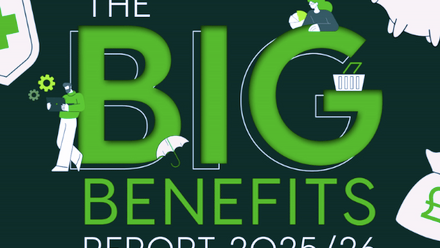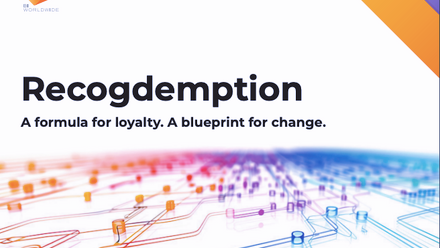How recognition supports changing employee expectations

Changing employee expectations
More than ever, organisations are expected to adapt to people’s personal circumstances and needs. Employees are also expecting a closer connection to their organisation. They want to feel connected to the company’s purpose, its values, the leaders and their colleagues, demanding modern leaders, who prioritise compassion, understanding and appreciation.
Meaningful vs transactional recognition
Our research found that at the height of the pandemic, employees that were recognised in the prior seven days were 103% more likely to feel supported by the organisation and 59% more likely to trust their leader. There was also a 47% increase in employee engagement and innovation.
Recognition is therefore vital in not only meeting, but exceeding employee expectations, helping them to feel supported and valued by the organisation. However it needs to be done right.
Too often, recognition is a transactional rather than a meaningful experience. Most of the time, rewards are automatically given to employees in exchange for great work, with no personal touch or presentation, and an opportunity is missed to create a peak, meaningful, memorable moment.
When recognition is transactional and not seen as a priority, 68% of employees are more likely to feel the recognition they receive is an empty gesture. Going through the motions to give people something is not enough. The recognition given needs to demonstrate that the employee is appreciated and people are valued not just for the work they do, but their unique contribution. There also needs to be continued emphasis on creating a personal, meaningful, memorable recognition experience, especially when employees are working remotely or social distancing at work.
Providing gift cards or meal vouchers, for example, can help lift spirits and morale, but don’t always show that the manager truly knows and cares for each person in their team. Many managers see recognition as an activity or task that needs to be done, but employees view it as a point of connection, which unfortunately is often missed. The best recognition experiences connect employees to purpose, accomplishment and one another.
How to make recognition meaningful
To create truly meaningful recognition moments, it’s important to consider the whole employee experience so employees feel valued and cared-for on a daily basis. After all, there’s no point focusing on creating an amazing recognition experience if this is undermined by the rest of the employee experience. Organisations should therefore consider:
- Strengthening connections
Positive moments have a long-lasting impact on the employee, so it’s important to look for ways to provide more positive experiences and points of connection, especially as work experiences are still in flux. These don’t have to be grand gestures, but small moments of true connection. Some ways to improve connection are to connect employee accomplishments to a bigger purpose, build gratitude into existing interactions with employees, expand your recognition toolbox and ensure leaders check-in with employees regularly, getting to know them on a personal level.
- Creating nurturing experiences
An important part of recognition is showing gratitude and demonstrating that employees are cared about. This means nurturing them by seeing the entire person and looking at ways to support their social and emotional wellbeing. Perhaps post care kits to employees’ homes when they’re homeworking and look at creating virtual ‘water cooler’ moments.
- Sharing success through storytelling
Storytelling is powerful. It helps share successes and strengthens bonds as employees work together towards the same purpose. The effects of recognition are amplified when great news is shared and made public. Effective ways to incorporate storytelling into the employee experience include using storytellers, creating a gratitude wall (whether it’s virtual or a physical wall of notes) and sharing recognition with the community and clients, connecting it to a broader purpose.
A final thought
With employees now expecting a personal and understanding relationship with their employer, it’s vital that organisations respond to this. Using recognition to create powerful employee experiences is key to success and must form part of any reward and benefit strategy.
The author is David Watts, culture and engagement strategist, O.C. Tanner Europe.
This article is provided by O.C. Tanner Europe.
Supplied by REBA Associate Member, O. C. Tanner
Giving teams the integrated tools they need when, where and how they need them.







